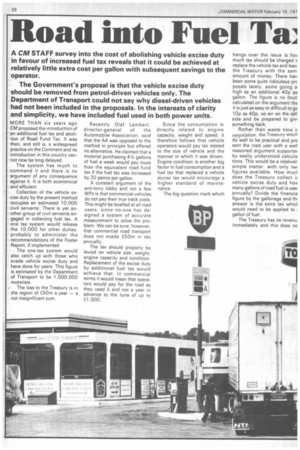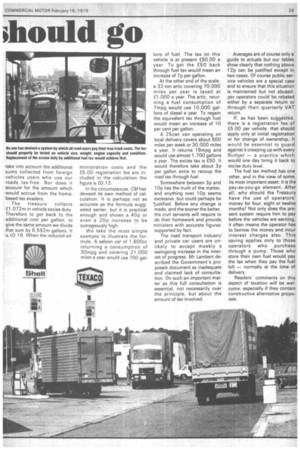Road into Fuel Ta]
Page 30

Page 31

If you've noticed an error in this article please click here to report it so we can fix it.
ihould go A CM STAFF survey into the cost of abolishing vehicle excise duty in favour of increased fuel tax reveals that it could be achieved at relatively little extra cost per gallon with subsequent savings to the operator.
The Government's proposal is that the vehicle excise duty should be removed from petrol-driven vehicles only. The Department of Transport could not say why diesel-driven vehicles had not been included in the proposals. In the interests of clarity and simplicity, we have included fuel used in both power units.
MORE THAN six years ago CM proposed the introduction of
an additional fuel tax and abolition of Road Fund Tax. It was then, and still is, a widespread practice on the Continent and its introduction in this country cannot now be long delayed.
The system has much to commend it and there is no argument of any consequence against it It is both economical and efficient.
Collection of the vehicle excise duty by the present method occupies an estimated 10,000 civil servants. There is yet another group of civil servants engaged in collecting fuel tax. A one tax system would release the 10,000 for other duties, probably to administer the recommendations of the Foster Report, if implemented.
The one-tax system would also catch up with those who evade vehicle excise duty and have done for years. This figure is estimated by the Department of Transport to be 1,000,000 motorists.
The loss to the Treasury is in the region of £50m a year — a not insignificant sum. Recently Olaf Lambert, director-general of the Automobile Association, said that the AA was opposed to the method in principle but offered no alternative. He claimed that a motorist purchasing 41/2 gallons of fuel a week would pay more than the equivalent road fund tax if the fuel tax was increased by 20 pence per gallon.
A constant argument of the anti-lorry lobby and not a few MPs is that commercial vehicles do not pay their true track costs. This might be levelled at all road users, since no-one has designed a system of accurate measurement to solve the problem. We can be sure, however, that commercial road transport does not evade £50m in tax annually.
The tax should properly be levied on vehicle size, weight, engine capacity and condition_ Replacement of the excise duty by additional fuel tax would achieve that. In commercial terms it would mean that operators would pay for the road as they used it and not a year in advance to the tune of up to £1,000. Since the consumption is directly related to engine capacity, weight and speed. it therefore follows that vehicle operators would pay tax related to the size of vehicle and the manner in which it was driven. Engine condition is another big factor in fuel consumption and a fuel tax that replaced a vehicle excise tax would encourage a higher standard of maintenance.
The big question mark which hangs over the issue is hoA much tax should be charged t replace the vehicle tax and leav the Treasury with the sam amount of money. There hay been some quite ridiculous prc posals lately, some going a high as an additional 40p pe gallon The figure is no doul: calculated on the argument tha it is just as easy or difficult to ge lOp as 40p, so err on the safi side and be prepared to givi something back.
Rather than waste time it negotiation, the Treasury wool, do well to be practical and pre sent the road user with a well reasoned argument supporte( by easily understood calcula tions. This would be a relative', simple matter, with only tw( figures available. How mud does the Treasury collect it vehicle excise duty and hov many gallons of road fuel is use annually? Divide the financia figure by the gallonage and fill answer is the extra tax whicl would need to be applied to ; gallon of fuel.
The Treasury has its revenu immediately and this does no take into account the additional sums collected from foreign vehicles users who use our roads tax-free, Nor does it account for the amount which would accrue from the home.. basedtax evaders.
The treasury collects £1,072m in vehicle excise duty. Therefore to get back to the additional cost per gallon, to give the same amount we divide that sum by 6,592m gallons. It is £0_16. When the reduced ad ministration costs and the £5_00 registration fee are included in the calculation the figure is £0.13_ In the circumstances, CM has devised its own method of calculation. It is perhaps not as accurate as the formula suggested earlier, but it is practical enough and shows a 40p or even a 20p increase to be outrageously high.
We take the most simple example to illustrate the formula. A saloon car of 1,600cc returning a consumption of 30mpg and covering 21,000 miles a year would use 700 gal Ions of fuel_ The tax on this vehicle is at present £50.00 a year. To get the £50 back through fuel tax would mean an increase of 7p per gallon.
At the other end of the scale, a 32-ton artic covering 70,000 miles per year is taxed at £1,000 a year. The artic, returning a fuel consumption of 7mpg would use 10,000 gallons of diesel a year. To regain the equivalent tax through fuel would mean an increase of 10 per cent per gallon.
A 25cw1 van operating on local delivery covers about 600 miles per week or 30,000 miles a year. It returns 18mpg and would use almost 1,700 gallons a year. The excise tax is £50. It would therefore take about 3p per gallon extra to recoup the road tax through fuel_ Somewhere between 3p and 10p lies the truth of the matter, and anything over 10p seems excessive, but could perhaps be 'justified_ Before any change is made, and the sooner the better, the civil servants will require to do their homework and provide ministers with accurate figures supported by fact.
The road transport industry and private car users are un likely to accept meekly a swingeing increase in the interest of progress. Mr Lambert de scribed the Government's pro posals document as inadequate and claimed lack of consulta tion, On such -an important matter as this full consultation is essential, not necessarily over the principle, but about the amount of tax involved. Averages are of course only a guide to actuals but our tables show clearly that nothing above 1 2p can be justified except in two cases. Of course public service vehicles are a special case and to ensure that this situation is maintained but not abused, psv operators could be rebated either by a separate return or through their quarterly VAT return.
If, as has been suggested, there is a registration fee of £5,00 per vehicle, that should apply only at initial registration or for change of ownership. It would he essential to guard against it creeping up with every Budget — a practice which would one day bring it back to excise duty level.
The fuel tax method has one other, and in the view of some, its most important asset it is the pay-as-you-go element. After all, why should the Treasury have the use of operators' money for four, eight or twelve months? Not only does the present system require him to pay before the vehicles are earning, it often means the operator has to borrow the money and incur interest charges also. This saving applies only to those operators who purchase through a pump. Those who store their own fuel would pay the tax when they pay the fuel bill — normally at the time of delivery.
Readers' comments on this aspect of taxation will be welcome, especially if they contain constructive alternative proposals.




















































































































